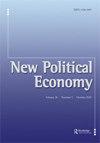Piercing the veil of monetarism: a decomposition of American inflation, 1970–1985
IF 3.8
2区 经济学
Q1 ECONOMICS
引用次数: 0
Abstract
ABSTRACT Over the course of the 1970s, inflation became a monetary phenomenon. At the beginning of the decade, price increases were attributed to a complex intersection of domestic and international forces. By the end of the decade, inflation was widely seen as a consequence of misguided government policy. What began as a partisan battle cry became a social scientific premise: the history of inflation in the 1970s in the United States is told by the political victors. This article recovers a set of facts buried beneath decades of ideological sedimentation. Through a decomposition of the statistical index of inflation, this article demonstrates that price increases in the 1970s were driven by a confluence of contingent events propagating through politically constructed markets. Sharp increases in the prices of tradeable global commodities combined with unprecedented interest rate hikes to send the Consumer Price Index to new highs. Through these component histories, the article demonstrates how the aggregate phenomenon of ‘inflation’ and its subsequent remission after 1982 marked the confluence of otherwise unrelated disruptions rather than ‘too much money chasing too few goods’ decisively upended by the Volcker shock.揭开货币主义的面纱:1970-1985年美国通货膨胀的分解
在20世纪70年代,通货膨胀成为一种货币现象。在本世纪初,价格上涨被归因于国内和国际力量的复杂交集。到90年代末,通胀被普遍视为政府政策误入歧途的结果。最初的党派之争变成了一个社会科学前提:20世纪70年代美国的通货膨胀史是由政治胜利者讲述的。这篇文章恢复了几十年来被意识形态沉淀所掩埋的一系列事实。通过对通货膨胀统计指数的分解,本文证明了20世纪70年代的价格上涨是由政治构建的市场中传播的偶然事件的汇合驱动的。可交易的全球大宗商品价格大幅上涨,再加上史无前例的加息,将消费者价格指数推至新高。通过这些组成部分的历史,本文展示了“通货膨胀”的总体现象及其在1982年之后的缓解如何标志着其他不相关的中断的汇合,而不是“太多的钱追逐过少的商品”被沃尔克冲击决定性地颠覆。
本文章由计算机程序翻译,如有差异,请以英文原文为准。
求助全文
约1分钟内获得全文
求助全文
来源期刊

New Political Economy
Multiple-
CiteScore
10.10
自引率
9.50%
发文量
41
期刊介绍:
New Political Economy aims to create a forum for work which combines the breadth of vision which characterised the classical political economy of the nineteenth century with the analytical advances of twentieth century social science. It seeks to represent the terrain of political economy scholarship across different disciplines, emphasising original and innovative work which explores new approaches and methodologies, and addresses core debates and issues of historical and contemporary relevance.
 求助内容:
求助内容: 应助结果提醒方式:
应助结果提醒方式:


